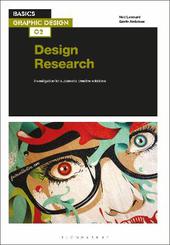
|
Basics Graphic Design 02: Design Research: Investigation for successful creative solutions
Paperback / softback
Main Details
| Title |
Basics Graphic Design 02: Design Research: Investigation for successful creative solutions
|
| Authors and Contributors |
By (author) Neil Leonard
|
|
By (author) Gavin Ambrose
|
| Series | Basics Graphic Design |
|---|
| Physical Properties |
| Format:Paperback / softback | | Pages:200 | | Dimensions(mm): Height 230,Width 160 |
|
| Category/Genre | Graphic design |
|---|
| ISBN/Barcode |
9781350167520
|
| Classifications | Dewey:741.6 |
|---|
| Audience | | General | | Tertiary Education (US: College) | |
|---|
| Illustrations |
200 colour illus
|
|
Publishing Details |
| Publisher |
Bloomsbury Publishing PLC
|
| Imprint |
Bloomsbury Visual Arts
|
| Publication Date |
5 February 2020 |
| Publication Country |
United Kingdom
|
Description
Design Research shows readers how to choose the best method of research in order to save time and get the right results.The book makes readers aware of all the different research methods, as well as how to carry out the most appropriate research for their graphic design projects. All stages of the research process are considered in a dynamic and entertaining style, covering audience, context, trends, sources, documentation, dissemination and more. Students and designers can benefit from this text by learning fresh ways to analyse information obtained by data gathering, and how best to test and prove decisions. The resulting, well-rounded solutions will be informed, innovative, and aesthetically fitting for the brief.
Author Biography
Neil Leonard is Associate Head of the Department of Design Communication at the University of the West of England, UK. Gavin Ambrose is a practicing graphic designer and teaches the Graphic Design BA at the University of Brighton, UK.
ReviewsIn a climate where a certain six letter word search engine is fast becoming the one-stop hit for every research need, this book shows a breadth of techniques, opportunities, methodologies and suggestions that will open up your creative thinking in a way that no algorithm ever could. You don't need to hit a search button, you don't need to feel lucky. You need to read this book. * Barrie Tullett, The Lincoln School of Art & Design, UK * Design Research is an easy to follow, clearly written, student friendly guide on how to conduct research for practical projects. Although academic in content, the fact that there are direct links to professional practice throughout, gives the book a 'real world' authority. The inclusion of case studies, interviews and supporting imagery purposefully link the relevance of the content to the practice of being a designer. Carefully building in complexity as the book progresses, the importance, practice, methods, and key terminology of research are introduced in a measured way, ensuring the reader is not overwhelmed - students who do not value research as part of the design process will not only be engaged throughout, but they will be in no doubt of its importance after reading this book. In fact, Design Research doesn't just take the reader through a step-by-step guide to the research process, it also highlights plenty of everyday good practice along the way. In writing this book, Leonard and Ambrose have gone a long way in validating to students what they are taught on a day-to-day basis in lecture theatres and workshops - Design Research should therefore be on any contextual studies reading list as a result. * Nigel Ball, Course Leader, School of Arts & Humanities, University Campus Suffolk, UK * A key part of the design process and often overlooked, a superb book dedicated to design research - An inspiring read! -- Kate Christman, Falmouth University, UK The book Basic Design 02: layout,is easy to understand and lots of photos and illustrations to explain the text. Great resource. Each chapter is flawlessly comprehensive and the pictures, diagrams and photographs make this book a must for any designer who is looking to fully understand the essential skills required for making a good layout. As the basic design 01:format it is a very good book to use as supporting material for my classes. -- Celine Duijndam, Hogeschool Rotterdam, The Netherlands
|